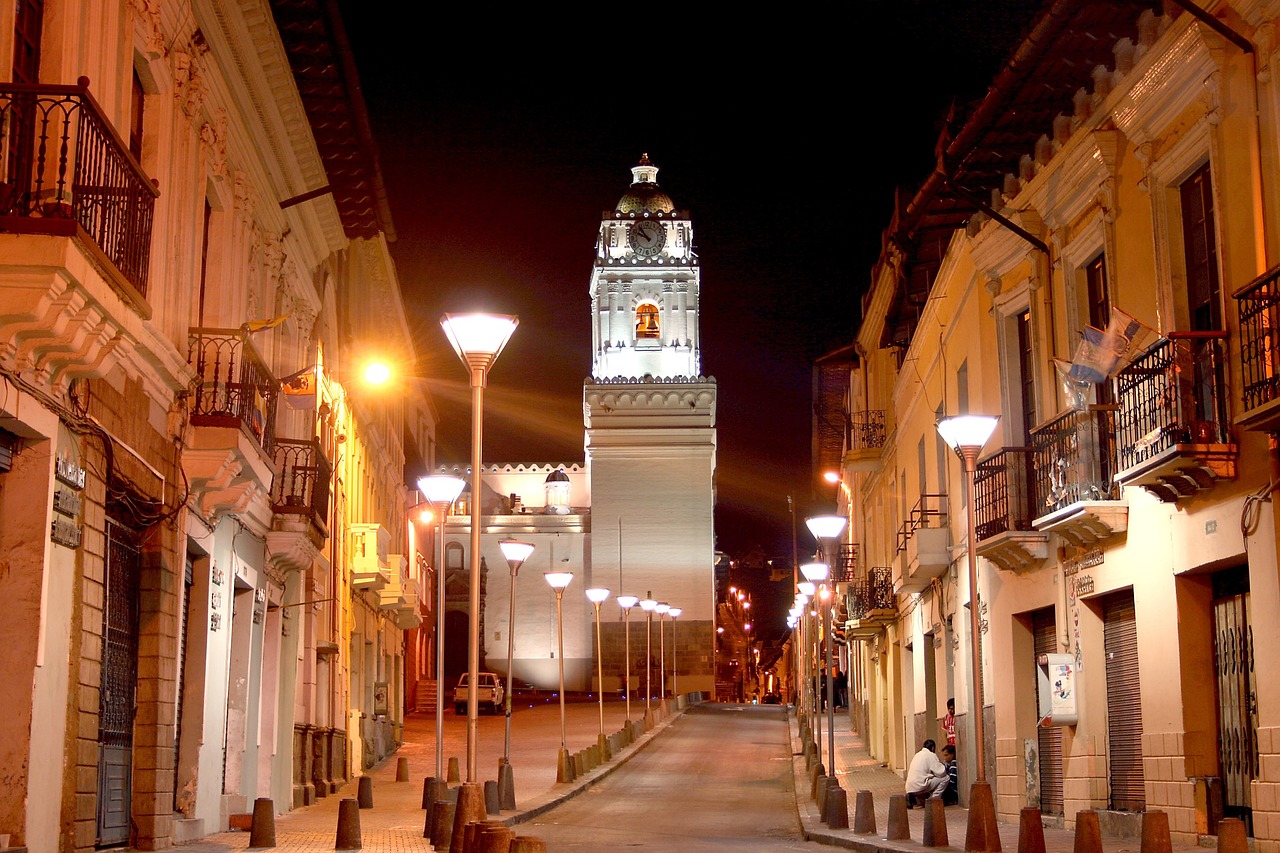Learning Ecuador Language: Quick Tips and Resources
Ecuador is a diverse and beautiful country in South America, known for its stunning landscapes, rich culture, and warm people. If you’re planning to visit or live in Ecuador, learning the local language can greatly enhance your experience and interactions with the locals. In this article, we will provide you with quick tips and resources to help you learn the Ecuadorian language effectively.
Section 1: Importance of Learning the Ecuadorian Language
Learning the Ecuadorian language, predominantly Spanish, is essential for anyone planning to immerse themselves in the country’s culture and daily life. By learning the language, you can:
- Connect with Locals: Speaking the local language allows you to communicate and build meaningful connections with Ecuadorians, fostering friendships and cultural understanding.
- Navigate Daily Life: Knowing the language will make it easier to handle everyday tasks such as ordering food, asking for directions, and shopping.
- Enhance Travel Experience: Exploring Ecuador becomes more enriching when you can understand the local language. You can fully appreciate historical sites, engage in conversations with locals, and delve deeper into the country’s heritage.
Section 2: Spanish Language Basics
Before diving into Ecuador-specific language tips, it’s important to have a strong foundation in the Spanish language. Here are some key Spanish language basics to get you started:
- Alphabet: The Spanish alphabet consists of 27 letters, including the addition of “ñ.” Familiarize yourself with the pronunciation and spelling of each letter.
- Common Phrases: Learn essential phrases such as greetings, introductions, and expressions of gratitude. These will help you initiate conversations and show respect to locals.
- Grammar: Understand basic grammar rules like verb conjugation, noun-adjective agreement, and sentence structure. This will enable you to form coherent sentences and express yourself effectively.
- Vocabulary: Build your vocabulary by learning commonly used words and phrases related to daily life, travel, and specific interests you may have.
Section 3: Ecuadorian Spanish
While Spanish is the official language of Ecuador, there are some distinct features and vocabulary specific to the country. Here are some key characteristics of Ecuadorian Spanish:
- Accent: Ecuadorians have a clear and neutral accent, making it easier for language learners to understand and imitate their pronunciation.
- Local Expressions: Familiarize yourself with Ecuadorian slang and idiomatic expressions commonly used in everyday conversations. This will help you sound more natural and connect with locals on a deeper level.
- Vocabulary Differences: Ecuador has its own unique vocabulary for certain words and phrases. For example, “bus” is called “colectivo” in Ecuador, and “money” is referred to as “plata.”
Section 4: Language Learning Apps and Websites
In the digital age, language learning has become more accessible than ever. Here are some popular language learning apps and websites that can aid your journey to mastering the Ecuadorian language:
- Duolingo: Duolingo offers interactive lessons and quizzes to help you learn Spanish vocabulary and grammar at your own pace.
- Rosetta Stone: Rosetta Stone provides immersive language learning experiences through its software and online platform. It focuses on developing conversational skills.
- Babbel: Babbel offers bite-sized lessons and real-life dialogues to help you quickly grasp essential Spanish phrases and vocabulary.
- FluentU: FluentU provides engaging video content with interactive subtitles, allowing you to learn Spanish through authentic videos.
Section 5: Language Exchange Programs
Language exchange programs are a fantastic way to practice your language skills with native speakers. Consider participating in these programs to enhance your Ecuadorian language learning:
- Tandem: Tandem is a language exchange app that connects language learners worldwide. Find a language partner from Ecuador and engage in conversation exchanges.
- Meetup Groups: Search for language exchange or conversation groups in your local area. These groups often organize meetups where you can practice speaking Spanish with native speakers.
- Online Language Exchange Platforms: Websites like ConversationExchange.com and InterPals.net allow you to connect with Ecuadorian language partners for virtual language exchanges.
Section 6: Language Schools and Courses in Ecuador
If you prefer a more structured approach to learning the Ecuadorian language, consider enrolling in language schools or courses within the country. Some reputable options include:
- Simon Bolivar Spanish School: Located in Quito, Simon Bolivar Spanish School offers personalized Spanish courses for all levels. They focus on cultural immersion and provide homestay options.
- Instituto Superior de Español: With locations in Quito, Cuenca, and the Galapagos Islands, Instituto Superior de Español offers intensive Spanish programs with experienced teachers.
- Andean Global Studies: Based in Otavalo, Andean Global Studies provides Spanish classes combined with cultural experiences, including homestays and volunteering opportunities.
Section 7: Language Learning Books and Resources
If you prefer traditional learning methods, language learning books and resources can be valuable tools. Here are some recommended options for learning Ecuadorian Spanish:
- “501 Spanish Verbs” by Christopher Kendris and Theodore Kendris: This book provides comprehensive verb conjugation tables and explanations, essential for mastering Spanish grammar.
- “Spanish Vocabulary” by BarCharts: This handy guide contains a wide range of vocabulary words, organized by topic, to help you expand your Spanish vocabulary.
- Online Blogs and Websites: Explore online blogs and websites dedicated to teaching Spanish. Some popular options include FluentU’s Spanish blog, SpanishDict, and StudySpanish.com.
Ecuador Image 1:

Section 8: Language Learning Communities
Joining language learning communities can provide valuable support and motivation on your language learning journey. Consider these communities to connect with fellow language enthusiasts:
- Reddit: The r/Spanish subreddit offers a supportive community where you can ask questions, share resources, and practice your language skills with others.
- Language Learning Forums: Websites like WordReference.com and How-to-Learn-Any-Language.com have active forums where language learners gather to discuss various languages, including Spanish.
- Facebook Groups: Search for Facebook groups dedicated to learning Spanish or Ecuadorian culture. These groups often share tips, resources, and organize language exchange events.
Section 9: Language Immersion in Ecuador
Immersing yourself in the Ecuadorian culture and language is an excellent way to accelerate your learning process. Consider these immersion opportunities:
- Homestays: Stay with a local family during your time in Ecuador. This immersive experience allows you to practice Spanish daily and gain insights into Ecuadorian customs and traditions.
- Volunteering: Engage in volunteer work within Ecuadorian communities. This not only provides opportunities to practice your language skills but also allows you to give back to the local community.
- Language Exchanges: Participate in language exchange events or find language partners who are eager to practice their English while helping you improve your Spanish.
Ecuador Image 2:

Section 10: Online Language Resources from Ecuador
Take advantage of online resources specifically focused on Ecuadorian Spanish. These resources provide insights into the local language and culture:
- Tu Ingles Online: This website offers free audio lessons focused on Ecuadorian Spanish, helping you understand the unique aspects of the language.
- YouTube Channels: Search for YouTube channels dedicated to teaching Ecuadorian Spanish. Some popular options include “Ecuadorian Spanish Lessons” and “Learn Ecuadorian Spanish with Daniel.”
- Ecuadorian Podcasts: Listen to Ecuadorian podcasts like “Radio Ambulante” and “Café con Leche” to improve your listening skills and familiarize yourself with Ecuadorian accents.
Section 11: Language Practice Tips
To solidify your language skills, incorporate these practice tips into your daily routine:
- Language Apps: Use language learning apps like HelloTalk and Tandem to practice speaking with native Ecuadorian speakers via voice or video calls.
- Watch Ecuadorian Movies and TV Shows: Stream Ecuadorian movies or TV shows with Spanish subtitles to improve your listening comprehension and exposure to the local language.
- Read Ecuadorian Literature: Explore works by Ecuadorian authors such as Jorge Icaza and Gabriel García Moreno. Reading literature exposes you to the language’s nuances and cultural references.
Ecuador Image 3:

Section 12: Conclusion
Learning the Ecuadorian language opens doors to deeper cultural experiences and connections during your time in Ecuador. Whether you choose to use language learning apps, attend language schools, or immerse yourself in the local culture, consistent practice and exposure to the language will lead to fluency over time. Embrace the journey and enjoy the process of learning a new language.
References
– Duolingo: www.duolingo.com
– Rosetta Stone: www.rosettastone.com
– Babbel: www.babbel.com
– FluentU: www.fluentu.com
– Tandem: www.tandem.net
– Simon Bolivar Spanish School: www.simon-bolivar.com
– Instituto Superior de Español: www.superiorspanishschool.com
– Andean Global Studies: www.andeanstudies.com
– “501 Spanish Verbs” by Christopher Kendris and Theodore Kendris
– “Spanish Vocabulary” by BarCharts
– FluentU Spanish Blog: www.fluentu.com/blog/spanish
– SpanishDict: www.spanishdict.com
– StudySpanish.com: www.studyspanish.com
– Reddit r/Spanish: www.reddit.com/r/Spanish
– WordReference: www.wordreference.com
– How-to-Learn-Any-Language: www.how-to-learn-any-language.com
– Tu Ingles Online: www.tuinglesonline.com
– “Ecuadorian Spanish Lessons” YouTube Channel
– “Learn Ecuadorian Spanish with Daniel” YouTube Channel
– “Radio Ambulante” Podcast
– “Café con Leche” Podcast


